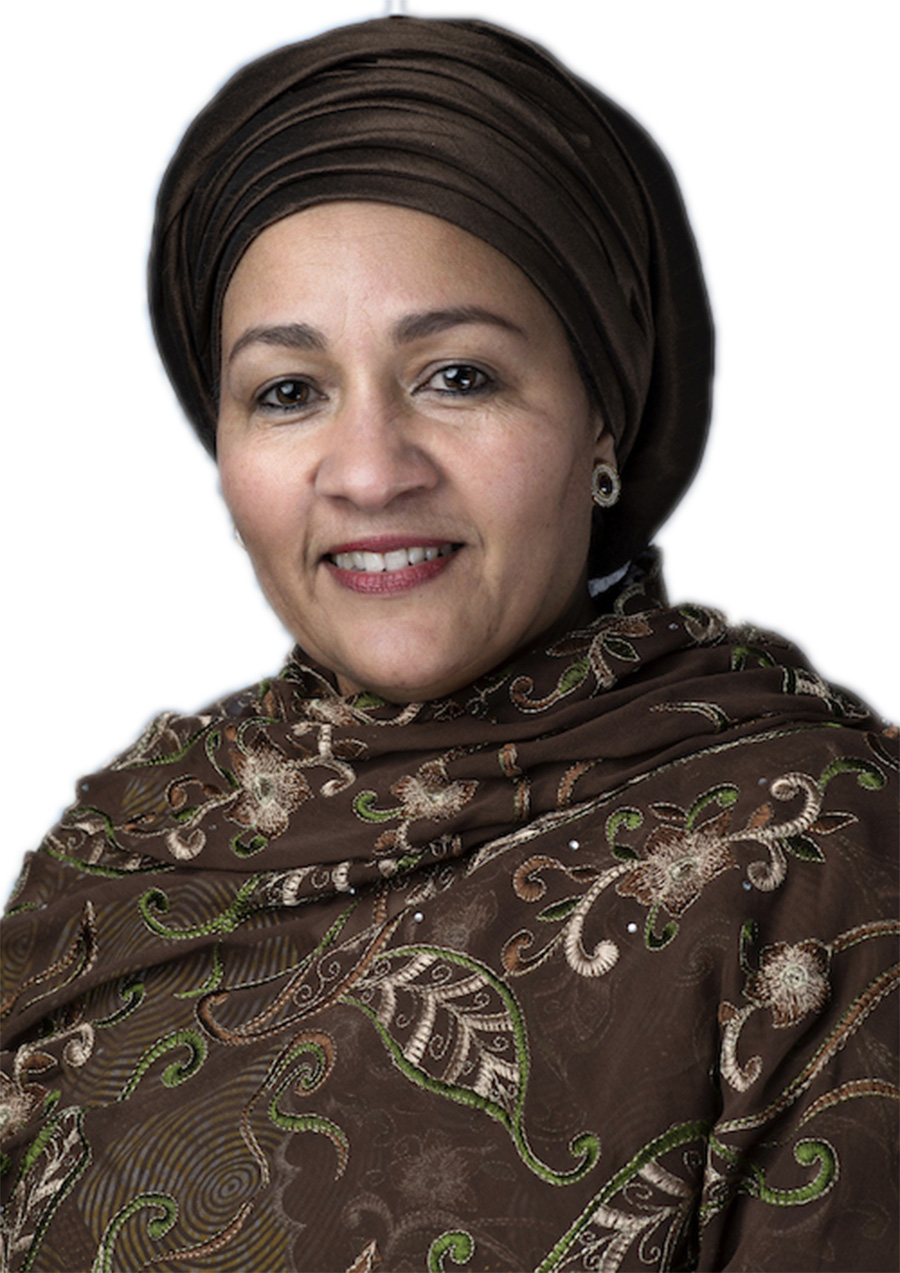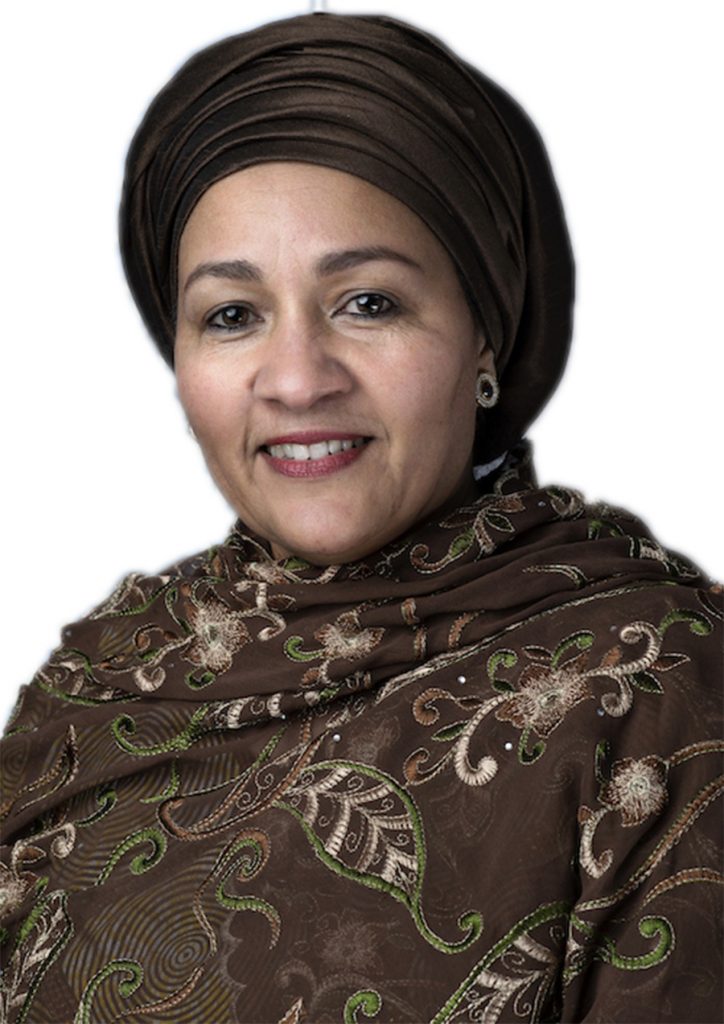
Ms. Amina Mohammed is the deputy secretary-general of the United Nations and chair of the United Nations Sustainable Development Group. Right at the top ranking level of the global body, she is part of the effort to deal head on with the world’s most intractable crises and developmental challenges.
She joined the United Nations in 2012 as special adviser to former secretary-general Ban Ki-moon. She held the responsibility for post-2015 development planning. Mohammed led the process that resulted in global agreement around the 2030 agenda for sustainable development and the creation of the sustainable development goals.
Her role in the world body is highly enriched by over 30 years of experience as a development practitioner in the public and private sectors as well as civil society. Prior to her appointment, she served as minister of environment of the Federal Republic of Nigeria where she steered the country’s effort on climate action, protecting the natural environment and conserving resources for sustainable development.
She was former chief executive officer/founder, Center for Development Policy Solutions. The centre is a think tank body established to address the policy and knowledge gaps within the government, parliament and private sector in development and civil society for robust advocacy materials.
Mohammed is also adjunct professor of the Master’s Programme for Development Practice at Columbia University, New York. Prior to that, she played top level roles in government in Nigeria, having served three successive presidents as adviser on poverty, public sector reform and sustainable development over a period of six years.
She served as senior special assistant to the president of the Federal Republic of Nigeria on the millennium development goals. In 2005, she was assigned the role of coordinating the debt relief funds to the tune of $1 billion per annum designated towards the achievement of millennium development goals in Nigeria.
Her role covered designing a virtual poverty fund with innovative approaches to poverty reduction, budget coordination and monitoring. It included providing advice on pertinent issues regarding poverty, public sector reform and sustainable development.
Between 2002 and 2005, Mohammed served as coordinator of the task force on gender and education for the United Nations millennium project. Prior to this, she served as founder and executive director of Afri-Projects Consortium, a multi-disciplinary firm of engineers and quantity surveyors (1991-2001) and worked with the architectural engineering firm of Archcon Nigeria in association with Norman and Dawbarn UK (1981-1991).
The projects centred on health management, education and public sector buildings in Nigeria. She began early as an advocate of increased access to education and other social services.
Mohammed currently serves on numerous international advisory panels and boards, including the Global Development Programme of the Bill and Melinda Gates Foundation, the Secretary General’s Global Sustainability Panel and the Hewlett Foundation on Education.

She is also on the boards of African Women’s Millennium Initiative, the Action Aid International, Right to Education Project, the Millennium Promise Initiative and the Institute of Scientific & Technical Information of China.
She serves as governor of the International Development Research Centre in Canada and currently chairs the advisory board of the United Nations Educational, Scientific and Cultural Organization’s (UNESCO) Global Monitoring Report on Education.
Her role is to get the world at large to embrace education as a human right and a central vehicle for building sustainable and resilient societies as well as for achieving personal aspirations and all the sustainable development goals. She is frantically driving home the message to the whole world that equipping children and youth with relevant knowledge and skills has a catalytic impact on eradicating poverty, reducing inequalities, improving health, driving economic growth and achieving gender equality.
Mohammed acknowledges that the effort is yielding great results globally in terms of great progress the world has made in advancing gender equality. She is impressed with a large increase in the number of girls now going to school and staying in school and a drop in the number of out-of-school girls over the last two decades. She is poised to do more, as the number of girls out of school remained large at about 132 million globally.
“Without investing in the youth to create an enabling environment for them to learn and acquire skills for decent work, sustainability, climate change awareness and global citizenship, we will not deliver on our promise for the future we want.
“Without ensuring quality and inclusive education for all, we will not be able to advance our efforts for more peaceful and inclusive societies and for promoting respect for human rights. Yet, we have seen warning signs that on current trends, the world is not on track to achieve the SDG4 goal and targets”, she told The Guardian.
She presses as strongly as she can for the world to hear and to put it into practice – that quality education and lifelong learning are foundational to all other aspects of human and sustainable development. “Without access to quality and relevant education, young people cannot build the skills needed to succeed in life and work, and consequently, they and their communities suffer”, she said.
Hers is a voice sounding to the whole world in a long raging battle against the odds. “We need to make sure that all children and youth have an equal chance — girls and boys, children and youth with disabilities, children and youth from marginalized communities. In order to achieve real progress on any of the SDGs, our approaches need to put education at the center”, she said.






